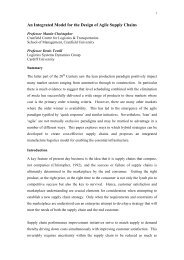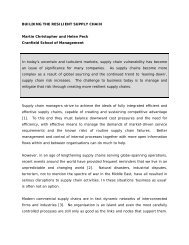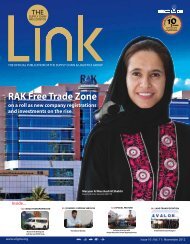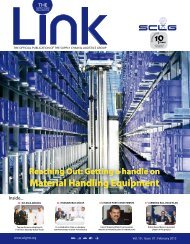Free to Download - SCLG
Free to Download - SCLG
Free to Download - SCLG
- TAGS
- download
- sclg
- sclgme.org
Create successful ePaper yourself
Turn your PDF publications into a flip-book with our unique Google optimized e-Paper software.
FINANCE Banking<br />
Bank investments<br />
in private equity: an<br />
unfair advantage?<br />
Private sec<strong>to</strong>r, government and logistics industry<br />
collaboration vital <strong>to</strong> realize potential economic success<br />
by Stuart Pallister<br />
A<br />
recent study has called in<strong>to</strong> question<br />
private equity investments by<br />
bank-affiliated PE firms. The study<br />
by INSEAD Professor Lily Fang with coauthors<br />
Vic<strong>to</strong>ria Ivashina and Josh Lerner<br />
of Harvard, called ‘An Unfair Advantage’?<br />
Combining Banking with Private Equity<br />
Investing, found that between 1983 and<br />
2009, bank-affiliated groups accounted for<br />
more than a quarter of all PE investments.<br />
It also found that the involvement of<br />
banks increases during peaks of PE cycles,<br />
with deals by bank-affiliated groups getting<br />
financing on ‘significantly better terms’ than<br />
other deals when the parent bank is part of<br />
the lending syndicate.<br />
Yet, the bank-affiliated PE investments<br />
have slightly worse outcomes and deals<br />
during market peaks have ‘significantly<br />
higher rates of bankruptcy’.<br />
So while there are clearly risks in<br />
combing bank and PE investing, are the<br />
bank-affiliated PE groups getting an unfair<br />
advantage?<br />
“We argue in the paper that the concerns<br />
that regula<strong>to</strong>rs have, in terms of allowing<br />
banks in<strong>to</strong> different risky opportunities<br />
and the concerns of risks associated with<br />
combining various activities (of banks and<br />
PE groups), do seem <strong>to</strong> be well justified”,<br />
Fang said in an interview with INSEAD<br />
Knowledge.<br />
The study was completed as US<br />
lawmakers considered the so-called ‘Volcker<br />
14<br />
bank-affiliated PE groups<br />
accounted for more than a<br />
quarter of all PE deals between<br />
1983 and 2009<br />
26 Link January 2011<br />
rule’, named after Paul Volcker, the former<br />
chairman of the Federal Reserve who had<br />
championed it. The rule, part of the Dodd-<br />
Frank Act, seeks <strong>to</strong> curb the proprietary<br />
trading operations of US banks, in terms of<br />
speculating on the markets.<br />
Fang says she and her co-authors were<br />
‘quite lucky’ with the timing of the paper.<br />
“We started this paper in early 2009. At<br />
the time, the ‘Volcker rule’ hadn’t been talked<br />
about and in fact the phrase -- ‘Volcker rule’<br />
-- hadn’t been coined.”<br />
She adds that the phrase became<br />
common currency a year later, just as the<br />
research team had prepared its initial draft.<br />
“The study compares the financing and<br />
performance of private equity deals done by<br />
bank-affiliated private equity groups (such as<br />
Goldman Sachs Capital Partners) with those<br />
done by standalone private equity groups<br />
(such as KKR).”<br />
“I, myself, was actually a bit surprised<br />
by how extensively banks were involved<br />
in private equity investments” as the<br />
researchers found that just 14 bank-affiliated<br />
PE groups accounted for more than a<br />
quarter of all PE deals between 1983 and<br />
2009.<br />
“That’s a significant amount. If we used<br />
our (data <strong>to</strong> assess) larger deals, they<br />
actually account for nearly 30 per cent of<br />
them.”<br />
There was also a high concentration<br />
of activity, with Goldman Sachs alone<br />
accounting for more than a third of all the<br />
deals done by bank-affiliated PE groups.<br />
Moreover, many of the bank-linked deals<br />
were done at the peaks of PE markets. One<br />
possible hypothesis is that this may have<br />
been due <strong>to</strong> the banks being more prepared<br />
<strong>to</strong> lend money based on the information they<br />
have about potential deals.<br />
However, the authors believe another<br />
hypothesis may be more relevant: that<br />
the banks can take advantage of creditexpansion<br />
cycles and then pass this capital<br />
on <strong>to</strong> their subsidiaries.<br />
“We do find that the banks seem <strong>to</strong> be<br />
able <strong>to</strong> take advantage of the cheap credit at<br />
the peak of the market and essentially that<br />
benefits the financing of the private equity<br />
deals done by their PE subsidiary.”<br />
Asked whether the Volcker rule, which

















